- Home
- Shannon Hale
The Actor and the Housewife Page 12
The Actor and the Housewife Read online
Page 12
As she turned to back up, Becky noticed that the minivan smelled strongly of french fries. She couldn’t remember the last time she’d taken the kids through a drive-through and gotten fries to qualm their troubled little souls. How could the smell still linger? Were there fries hiding under car seats, stowing away under benches, squished beneath floor mats? And when was she going to have time to check?
There were lots of things Felix’s presence made her notice—how tiny the houses were in her neighborhood, how unkempt many of the lawns. At the entrance to their development was a low brick wall with scripty metal letters spelling out somerset estates. When she and Mike had been house shopping, she’d thought the name of the development completely lovely, evoking at once a dreamy English countryside and something ancient and regal. Now, she squirmed.
A block later, he cleared his throat. “Somerset Estates?”
“Yeah, I was hoping you hadn’t noticed.”
The ward potluck was held in the church’s “cultural hall,” which was an indoor basketball court with a stage at one end and wide doors connecting to the kitchen. She found Mike, but he was chained to a conversation with the elderly and apparently angry Brother Brunson, so he just greeted her with a nod and returned his attention to the ranter.
Her heart gushed to see him. There was no one better in the room to take care of what ever the problem was than her Mike.
White and pink plastic sheets covered round folding tables, with centerpieces of elaborate tole-painted wooden daisies on beds of intricate paper grass—the kind of homemade art that would make Martha Stewart shed tears of envy. It was clearly Christine’s doing. Last spring they’d had an Under the Sea–themed party, and Christine had created a twenty-foot-long humpback whale out of construction paper and hung it from the ceiling.
“Hi Becky!” Christine rushed up, her hands full of paper petals that left a clumsy trail behind her. “What do you think of the centerpieces?”
Becky almost said, “What, they don’t spin in circles and sing ‘It’s a Small World’?” But sarcasm-as-compliment would be lost on sweet Christine, so she said, “They are so gorgeous I still can’t catch my breath.”
Christine was staring at Felix’s face, then down to his left hand, which didn’t bear a wedding ring. He never wore his ring when in production. Christine was single, forty-three, and of the steamroller personality when looking for a mate. That was the word she would use—mate.
“Uh, Christine, this is Felix, a friend of the family, who’s staying with us for a few days.”
“He’s staying with you?” Christine was standing on her toes. “For a few days? You come to dinner at my house tomorrow. Tomorrow night. I insist. I’ll have a feast prepared. I’ll see you at six.”
“Er,” Felix said.
Becky had a sudden instinct to throw herself in front of her friend, as if he were an allergy-prone boy facing a hive of angry bees. “Christine, we’re busy tomorrow night, actually, and—”
“Sunday then. See you at six!” She scuttled away before any protest could reach her ears.
Felix whispered, “Which was she, Arsenic or Old Lace?”
Fiona, the only Jack child who hadn’t wandered off to play on the stage, was snickering. When had her little girl grown up enough to understand adult social situations?
“Fiona, don’t you want to run along and play?”
“Not really.”
“Run along now,” Becky said with emphasis. Fiona rolled her eyes and stalked off . “Felix, I’m sorry. I should’ve called you Rufus or something.”
“Just tell me, what is that?” He pointed to a huge punch bowl filled with orangish-green liquid, blobs of unknown origin floating on the soapy surface.
“That’s . . . that’s . . . it’s a drink. Probably Sprite and orange juice with lime sherbet.”
Felix’s eyes widened. “By the ghost of Hamlet’s father . . .”
“It does look pretty revolting, now that you mention it. Why don’t we find a table?”
Felix was still holding the bag with the six loaves of zucchini bread and he dropped them off on the buff et tables. A woman with salt-and-pepper hair in a heavily sprayed helmet-do turned to take them. It was Kirsten Nutter. Stop, Felix, Becky wanted to warn. Halt! Desist! Danger ahead! But Felix was already in physical contact with that darling, lovely, meddling woman.
“Let me help . . .” Kirsten paused. She stared, her mouth open. “You’re famous, aren’t you? I know you.”
“Er, I’m a friend of the Jack family. I’m just—”
“You’re Felix Callahan! I didn’t know you were LDS. That’s so fantastic that you’re LDS!”
“I’m not . . . I’m just . . . I don’t know what you’re talking about. I’m a friend of—”
Kirsten grabbed a young, blonde woman by the arm. “Look, look, did you know that Felix Callahan was LDS? I’d heard that Steve Martin was, but I didn’t know—”
“You are?” The blonde squinted and adjusted the infant in her arms. “But your last movie was rated R.”
“I . . . I’m a friend of—” Felix started.
“Well, don’t bother him, Kirsten,” the blonde said. “I’m sure he doesn’t want to be fussed over. I hope you feel at home, Brother Callahan. Have some punch.” She handed him a cup of the punchlike concoction with an extra lump of melting green sherbet.
“Were they accusing me of drug use?” Felix whispered as Becky hurried him away.
“ ‘LDS’ stands for ‘Latter-day Saint.’ They think you’re Mormon.”
“Ah. That’s just . . .”
“Tabloid-worthy?”
“I doubt even the tabloid readers would believe that.” He was staring at the lumpy punch in his hand with undisguised horror.
“And yet in Layton, Utah, it’s no doubt already considered fact. I wouldn’t be surprised if the news has reached as far as Ogden. We are a hopeful lot.”
She spotted the shivering ’fro of her friend Jessie across the cultural hall and rushed Felix that way. Becky was extremely fond of her fellow ward members, and it just wasn’t fair that he’d met some of the quirkiest among them right off . Jessie would balance things out.
Jessie would balance “Jessie! I want you to meet my friend Felix.”
Jessie stood up to shake Felix’s hand. “It’s great to meet you. And you couldn’t have picked a better friend than Becky.”
“Likewise, I’m sure.”
“Jessie studied dance at Juilliard and was a member of the Martha Graham Dance Company before she gave it up to have children,” Becky bragged.
Felix glanced at the five-year-old girl engrossed in a coloring book at the table then turned back to Jessie. “You gave up professional dance to have children?”
“Yeah, I did.”
“And moved to Layton, Utah.”
“Well, yeah, my husband’s job brought us here.”
“So . . . congratulations?”
“Um . . . thanks?”
Becky considered smacking Felix, but she could see he didn’t mean to be offensive—he was sincerely confused. She cleared her throat.
“Jessie’s youngest is in school, so she decided to go back to work and just started with Ririe-Woodbury, this really amazing local dance company. She’ll be choreographing a piece for their upcoming show.”
“Ah,” Felix said.
“Yeah . . .” Jessie said unsurely. “It’s . . . it’s nice. I feel very blessed. I mean, it’s hard to have it all, but I’m doing my best.”
“That’s all anyone can do, I suppose.” Felix spoke like an automaton programmed to sound almost interested.
“That’s the truth. So . . . what do you think about Utah?”
“The mountains are lovely. My wife and I skied in Park City last year.”
“Oh yeah, Park City’s beautiful. So . . . I think Becky mentioned you have an apartment in New York. What neighborhood?”
“Upper West Side, near the park.”
“Nice. My first
place was in the West Forties—not so nice, but it was New York. I still miss it.”
“It is a unique city.”
“Yes, that’s true.”
Both Jessie and Felix were looking at Becky now, expecting her to save them. Her mind blanked, and she smiled with so much teeth she felt like an alligator.
“Becky, tell me you brought your famous zucchini bread,” Jessie said.
“I did indeed!”
“I’d better grab some before it’s all gone. Nice to meet you, Felix!” And Jessie scurried off .
After that, Becky picked out a far-flung table in the corner, placed Felix with his back to the room, and decided to keep him to herself. She even filled up a plate of food for him at the buff et table, along with Sam’s and Hyrum’s plates. Because her hands were full, Mike made up a plate for her, then Fiona got a plate for her dad. Polly was the only one who served herself and so ate only white dinner rolls.
During the dinner hour, there were stares. And whispers. And people slowing down as they passed the Jacks’ table and gaping at Felix as if at a traffic accident. A few bold ones approached.
Mari Moss, age seventeen: “So, hi, so my friends bet me I wouldn’t dare to come talk to you but I totally am, and I’m even going to ask you to autograph a napkin. I know, I am so bold.”
Melanie Bradford, PTA president and mother of two sets of twins: “I just wanted to tell you how much I enjoy your films, but I wondered, do you have any control over the editing and such? I just hate to see so much violence and profanity.”
Lorrie Kimball, CPA and mother of three boys, ages one, two, and three: “I just want you to know that while everyone else is either standing back and staring or fawning and drooling, I’m going to treat you like a completely normal person. I’m not fazed at all.”
Occasionally, Mike laughed into his napkin. He seemed to be the only person at their table who was having a terrific time.
“Thanks for not pulling out Diplomatic Felix,” Becky whispered. “You’re showing admirable restraint. They really are very nice people. The more sane ones are being polite and giving you space while the others . . . Well, they’re just . . . they’re . . . we’re not used to . . . if Tom Selleck showed up here, I’d probably make a complete idiot out of myself.”
myself.”
“And why didn’t meeting me cause the same effect?”
“Come on, sweetie. You’re great and all, but you’re no Tom Sell-eck.”
“What does he do? He smiles with dimples and grows a mustache.”
Becky patted his arm consolingly. “Someday you’ll be able to grow a mustache too. Just give it time.”
They partook of ham and rolls, green bean casserole, green salad and fruit salad and pasta salad and Jell-O salad, and in the silence Becky became more and more aware of the conversations around them.
“Hey, Bonnie, did you say you want one baby hamster or two?”
“Oh, we’ll take two, if they’re both little boys or little girls. I don’t want to open their cage one morning and find a nest of them.”
“Wish I’d thought of that a few weeks ago.”
“Are you still with Weight Watchers?”
“Nah, I went off it again. I mean, all the counting. Me with math! I mean, I can’t add two and two, you know what I mean? Two and two! I’m serious, you know what I mean? I can’t add to save my life.”
“Yeah . . .”
“Yeah, can’t add to save my life. Not even two and two, you know what I mean? Ha!”
“Yeah, it’s good to be healthy.”
“Yeah, that’s important. And I’ve been reading about eating fruit every day, but not the peels, because that’s where the pesticide toxins live. That’s important.”
“Yeah.”
Becky’s face was set on permanent wince. She kept her eyes on her plate and poked at her Jell-O salad, letting its fabulous green body (neither solid nor liquid!) wiggle gleefully. The harder she tried to tune out the conversation, the more she absorbed every word, eavesdropping with an ear for how it must sound to Felix. What did his friends talk about? Not hamsters and Weight Watchers, she was pretty sure. Not that there was anything wrong with that. These were perfectly wonderful people, and who said that the rich and fashionable are superior to anyone else? Who said their conversation is any more important than that of a middle-class housewife?
“I mean, it’s not like I have time to work out. I chase around a toddler and two schoolkids all day—now that’s a workout!”
“Well, you look . . . I like those pants. Where did you get those pants?”
“T.J. Maxx. Four bucks. Can you believe it? Four bucks. How can you say no to four-dollar pants?”
“Wow, that’s . . . what fabric is that?”
“Polyester or something. They’re a size too small, but really, can you say no to four-dollar pants? I mean, really! I mean, come on!”
Becky smiled at Felix through her wince. “Having fun? You just wait—this magnificent feast and riveting repartee is only half of tonight’s gala. Next up is a world-class talent show.”
“Maybe I’ll call a cab and leave you all to it,” Felix said.
Becky’s smile felt sad. “This isn’t New York. It’d take at least half an hour to get here. By then the program will be over.”
He nodded and leaned back as if readying himself for the worst. The bishop stood to get everyone’s attention so the program could begin, and in the sudden hush, someone could be heard to whisper too loudly, “Who’s Felix Galahad?”
The program consisted of several casual musical numbers: two members of the high school marching band played a squeaky clarinet duet; a sixty-five-year-old soprano sang an Italian aria (sans Felix’s presence, this one would have impressed Becky to death); the ward’s token over-forty bachelor played the theme from The Godfather on the accordion. Then the four-and five-year-olds sang “I Am a Child of God.” Hyrum was there with his classmates, singing boldly, completely un-self-aware, their chins raised, their tiny voices scratching out a melody, their arms and legs unable to hold still for a moment, fidgeting as they sang.
Becky couldn’t see Hyrum after the first verse because the waterworks started. Becky hadn’t cried for sadness since she’d been thirteen years old and her older brothers had discovered her singing to the mirror. Ah, the hours of entertainment her brothers derived! As part of her recovery, she forced herself to stay dry-eyed for a good ten years, not even weeping at the movies. Then she had children, and suddenly there were a thousand sparkling moments of beauty that seized her by her throat and shook the tears right out.
After the song was over, she realized Felix was staring at her.
“Why were you crying?” His voice was soft with curiosity.
She didn’t know how to explain how she felt about Hyrum, let alone the song. He’d been her baby, cradled in her arms and nestled into her chest. Now he was five, so big and clever, in kindergarten, wrestling with his new identity as an individual who makes his own decisions and has friends and suffers the teasing and insecurities and danger that every five-year-old must face. She wanted to snuggle him and keep him safe and warm. But it also thrilled her to see him enter the world, so brave and excited, ready to conquer it all. And to hear his little voice singing that song—the pure childhood sweetness of it, the simple faith of it, laying out all that she felt in her soul for God and family. Describing that sensation seemed like trying to describe the taste of salt.
“Beauty makes me cry sometimes,” she said finally.
“Beauty? But . . . they were . . . never mind.”
What had he been about to say? That they were just children, that they were all off-tune and forgetting words, that their performance was nothing worth admiring?
They looked at each other, Becky and Felix, and she guessed that he too was feeling a gap press between them. Perhaps she looked as strange and foreign to him as he did to her, and she wondered what could possibly hold them together.
When Hyrum dashe
d back to their table, he went straight for his daddy. Mike grabbed him and swooped him into the air like a fighter plane then back into his arms for a quick hug.
“Great job, chief,” Mike said. “I could hear every word you sang. Your lungs are so strong they must be made out of titanium.”
“Yeah, Dad! Titanium!”
Becky glowed at her boy then turned to Felix, gloomy confusion on his face. Why all the praise for such a mediocre performance? he seemed to question. Why care so much for the squeals of a child?
On the ride home, everyone was quiet, even Sam. As if he sensed tension, he looked around with wide eyes, sucking ardently on his pacifier. At least he was strapped into his car seat and couldn’t force one into Becky’s mouth.
The next morning, the family ate one of the leftover loaves of zucchini bread for breakfast. Felix had oatmeal. By noon, he was on his way to the airport, returning early to Los Angeles. He’d insisted on calling a cab rather than bother Becky for a ride.
“Well, good-bye, thanks for coming,” Becky said at the door.
“Perhaps you could let Christine know I won’t be able to make our dinner date?”
“Sure, right. I’ll do that.”
“Good. Thank you. Good-bye.”
He stood in the doorway, holding his suitcase, then nodded in farewell and left.
It was not the first time she thought she would never see him again, but this time she had no doubt she was right. She didn’t let herself feel any which way about that. Shutting the door, she went back to the kitchen to clean up after breakfast.
“What do you want to do today?” Mike asked.
Becky smiled. “Everything.”
In which long-distance charges apply
The calendar clung to September, but Becky was still in mourning for the wide open weeks of summer, a full and noisy house, outings to the zoo and pools and canyons. Becky didn’t see autumn as a glorious and exciting time of change, wind peeling away layers, alternately breathing chill on your neck and cuddling you in bright bursts of warmth. No. She saw autumn as Not Summer.

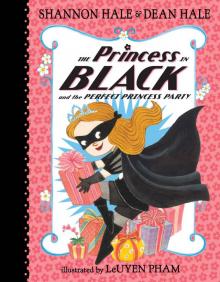 The Princess in Black and the Perfect Princess Party
The Princess in Black and the Perfect Princess Party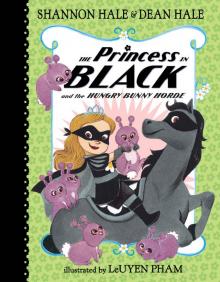 The Princess in Black and the Hungry Bunny Horde
The Princess in Black and the Hungry Bunny Horde The Unfairest of Them All
The Unfairest of Them All Forest Born
Forest Born 2 Fuzzy, 2 Furious
2 Fuzzy, 2 Furious The Actor and the Housewife
The Actor and the Housewife The Goose Girl
The Goose Girl Palace of Stone
Palace of Stone Midnight in Austenland
Midnight in Austenland Enna Burning
Enna Burning Dangerous
Dangerous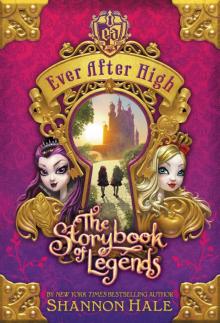 The Storybook of Legends
The Storybook of Legends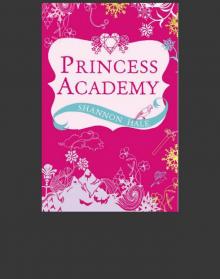 Princess Academy
Princess Academy Austenland
Austenland The Forgotten Sisters
The Forgotten Sisters The Unbeatable Squirrel Girl: Squirrel Meets World
The Unbeatable Squirrel Girl: Squirrel Meets World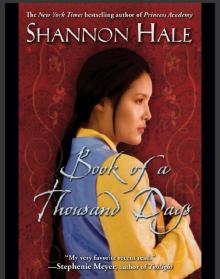 Book of a Thousand Days
Book of a Thousand Days Fire and Ice
Fire and Ice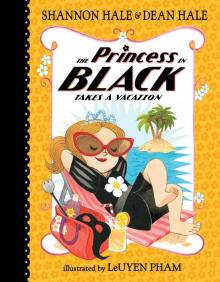 The Princess in Black Takes a Vacation
The Princess in Black Takes a Vacation River Secrets
River Secrets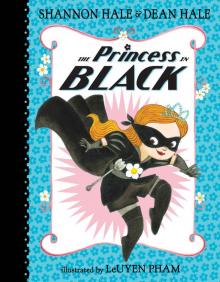 The Princess in Black
The Princess in Black Books of Bayern Series Bundle
Books of Bayern Series Bundle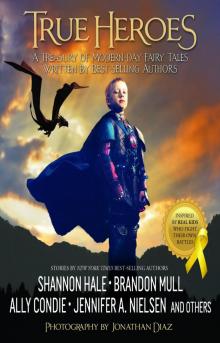 True Heroes
True Heroes Austenland: A Novel
Austenland: A Novel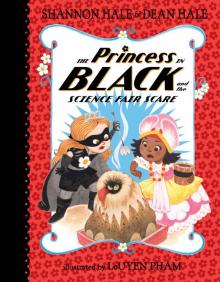 The Princess in Black and the Science Fair Scare
The Princess in Black and the Science Fair Scare![[Bayern 02] - Enna Burning Read online](http://i1.bookreadfree.com/i1/04/02/bayern_02_-_enna_burning_preview.jpg) [Bayern 02] - Enna Burning
[Bayern 02] - Enna Burning Ever After High
Ever After High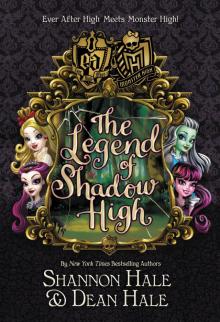 Monster High/Ever After High--The Legend of Shadow High
Monster High/Ever After High--The Legend of Shadow High